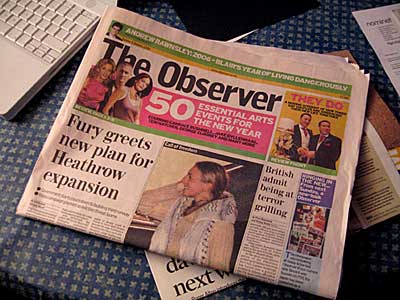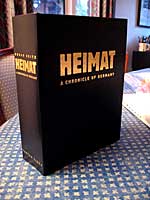I’ve been watching Heimat over the Christmas break, and finding it even better than I remembered. For those unfamiliar with it, Heimat is an eleven-part fictional account of life in a small German village during the rise of the Nazis and afterwards.
On paper, it must seem very dull. The characters are not in the least flamboyant — it’s very much a story about ‘ordinary’ folk; and nothing much happens — except that the Nazification of life and the annexation of the state for ideological purposes gradually seeps into every crevice of daily living. There are few real villains, and only the quietest of heroes (or, more accurately, heroines — the central women characters come out of it well.) People who were weak and/or nasty before the rise of Hitler become exploiters of, or slaves to, the new ideology; while those who were always strong or balanced tend to retain their judgement and common sense — even if they sometimes have to rein in their tongues.
And it also communicates vividly how convincing prosperity is to the average citizen — especially if s/he has previously experienced economic hardship (as most German citizens did in the 1920s.) It’s as if prosperity dissolves doubt and uncertainty. (We saw a lot of that in booming Ireland a few weeks ago, as people thronged shops in a frantic Christmas spending splurge.) Heimat captures very well the growing public acceptance of the regime as economic conditions improve, shopkeepers’ turnover increases and people are able to buy cars and consumer goods. (One memorable episode is entitled “The Best Christmas Ever”, and chronicles the quiet satisfaction the villagers felt as 1935 turned into 1936.)
The series is a masterful evocation of the steady perversion of a civic culture. It is also an antidote to complacency: I myself come from a rural background, and could imagine many of the same things happening in the communities in which I was reared. So I was very struck by this quote from Richard Evans’s new book, The Third Reich in Power.
‘The further in time we get from Nazi Germany, the more difficult it becomes for historians living in democratic political systems … to make the leap of imagination necessary to understand people’s behaviour in a state such as Nazi Germany.’
The significance of Heimat as a creative work is that it makes that ‘leap of imagination’ possible.





